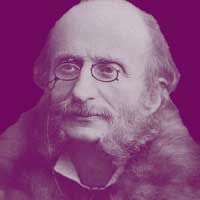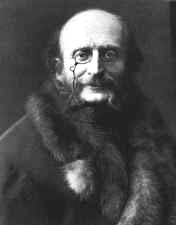Jacques Offenbach - Biography
Jacques Offenbach Biography
Jacques Offenbach (June 20, 1819 – October 4, 1880), composer and cellist, the creator of 'La vie Parisienne' and an originator of the operetta form, a precursor of the modern musical comedy. He was one of the most influential composers of popular music in Europe in the 19th century, and many of his works remain in the repertory.
| Contents |
Biography
Offenbach was of German birth and was Jewish, born Jacob Eberst, the son of Isaac Juda Eberst, a synagogue cantor, bookbinder, music teacher and composer. His father was living in Köln in 1807 when the Napoleonic edict required that Jews had to take inheritable family names, and he took the name of Offenbach since he was already known there as 'Der Offenbacher'.
Jacques moved to Paris in 1833 to study the cello. He found employment playing cello in the orchestra of the Opera Comique, and wrote several pieces for the instrument. In 1844, he married Herminie de Alcain. In 1850 he became conductor of the Theatre Francais, but in 1855 rented his own theatre, the Bouffes Parisiens on the Champs Élysées, and began a successful career devoted largely to operetta and opéras comiques until his death. His most popular works are still performed regularly today. He also wrote much dance music, especially the can-can style. His best known operettas in the English-speaking world are Orpheus in the Underworld, La Vie parisienne, La Belle Hélène, La Perichole and The Grand Duchess of Gerolstein.
Offenbach's final opera, The Tales of Hoffmann, was more serious than his other works, reflecting perhaps the eternal wish of the clown to be taken seriously. It was still unfinished at his death, and was completed by his best friend Ernest Guiraud, and premiered in 1881.
He is buried in the Cimetière de Montmartre, Paris, France.
Works
Offenbach wrote more than ninety pieces for the stage. Some of his works include:
- Les deux Aveugles
- Le Nuit blanche
- Ba-ta-clan
- La Rose de Saint-Flour
- Le Savetier et le Financier
- Dragonette
- Le Vent du Soir ou L'horrible Festin
- Une Demoiselle en loterie
- Le Mariage aux lanternes
- Les deux Pêcheurs
- Orphée aux Enfers (Orpheus in the Underworld)
- Les Vivandières de la Grande Armée
- Geneviève de Brabant
- Daphnis et Chloé
- Le Chanson de Fortunio
- Le Pont des soupirs
- Le Roman comique
- Les Bavards
- Lischen et Fritzchen
- Le Brésilien
- Jeanne qui pleure et Jean qui rit
- L'amour chanteur
- Die Rheinnixen ,
- La belle Hélène (Fair Helen)
- Les Bergers
- Barbe-Bleue (Bluebeard)
- La Vie Parisienne
- La permission de dix heures
- La Grande Duchesse de Gerolstein (The Grand Duchess of Gerolstein)
- Robinson Crusoe
- L'Ile de Tulipatan
- La Périchole
- La Diva
- La Princesse de Trébizonde
- Les Brigands
- Boule de Neige
- Le Roi Carotte
- Fantasio
- Fleurette
- Les Braçonniers
- Pomme d'Api
- Bagatelle
- Le Violoneux
- La Boulangère a des écus
- Madame l'Archiduc
- La Créole
- Le Voyage dans la lune
- Tarte à la Crème
- Pierrette et Jacquot
- La boîte au lait
- La Foire Saint-Laurent
- Madame Favart
- La Marocaine
- La fille du Tambour-Major
- Les Contes d'Hoffmann (The Tales of Hoffmann).
References and External Links
- http://www.naxos.com/composer/offenbac.htm
- http://www.lessontutor.com/bf_offenbach.html
- La Périchole plot summary (http://www.geocities.com/jrpsong/per.html)
- http://www.jacques-offenbach.de (biography, catalogue of works, discography)
This biography is published under the GNU Licence

